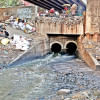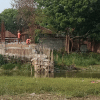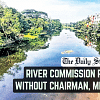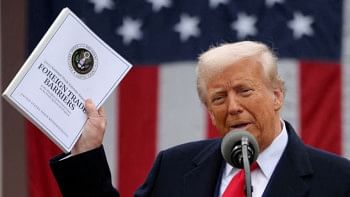Proper sewage management is vital for a megacity

It is unfortunate that a decade after adopting a master plan to address the city's sewage problem, the Dhaka Water Supply and Sewerage Authority (Wasa) has made little progress in its implementation. The plan originally envisioned the establishment of five sewage treatment plants across Dhaka, but only one—the Dasherkandi plant—was set up two years ago. Unfortunately, this facility is still not fully operational, as it has not been connected to Wasa's sewerage network. Moreover, while Wasa is struggling to acquire land for its Mirpur and Rayerbazar treatment facilities, it has yet to complete the feasibility study for the plant in Uttara. In the absence of proper sewage treatment facilities, most of the city's sewage now ends up in rivers and such water bodies.
Our report in this regard cites a recent study by the River and Delta Research Centre that revealed alarming levels of pollution in rivers surrounding Dhaka—Buriganga, Turag, Shitalakkhya, and Balu. It identified 102 industrial waste outlets, 75 municipal sewer lines, and 216 private outlets discharging untreated waste into these rivers. Additionally, pollutants enter through 38 sluice gates, 62 service canals, and 441 dumping points. Industrial units, dockyards, and markets are exacerbating the problem.
Experts, however, say the Wasa master plan was unrealistic to begin with, given the challenges of finding suitable land for large-scale projects in a densely populated city like Dhaka. With the plan proving ineffective, authorities should instead prioritise localised solutions, such as mandatory septic tanks, small-scale treatment plants, and strict enforcement of building regulations. Small treatment plants should be established in large housing project areas, while the construction of modular treatment systems should be made mandatory for high-rise buildings. Our current construction rules require septic tanks in buildings outside the sewerage network. Despite past efforts by the two city corporations to block sewage outlets and enforce this rule, their attempts were largely unsuccessful. To ensure compliance, Wasa, city corporations, and Rajuk must intensify their efforts, while building owners must also adhere to the provision during construction. Moreover, the Dasherkandi plant should be brought under Wasa's sewerage network as it could treat up to five lakh tonnes of sewage per day; the Pagla sewage treatment plant must also be urgently repaired.
Dhaka is becoming increasingly unliveable with its air and water becoming severely polluted, endangering the lives of its residents. To protect this city and its residents, the government must come up with a new vision—a new master plan—with a clear strategy to address the city's persistent sewage pollution, save our rivers and water bodies, and ensure a healthier environment.

 For all latest news, follow The Daily Star's Google News channel.
For all latest news, follow The Daily Star's Google News channel. 








Comments